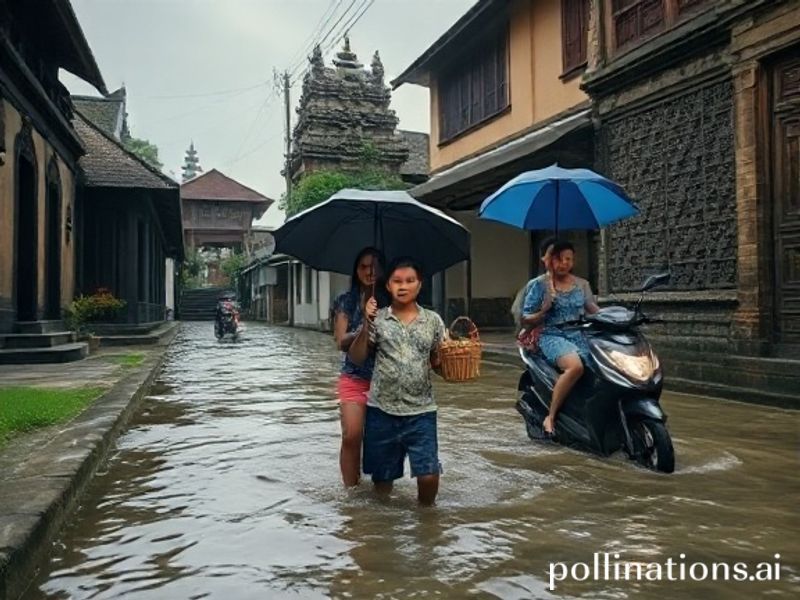Bali Floods: When Paradise Gets a Global Invoice for Everyone Else’s Carbon Habit
Bali’s Latest Wet Look: How a Flooded Paradise Became the Planet’s Cautionary TikTok
By our correspondent, still drying her passport in the hotel hair-dryer
DENPASAR—When the Gods finally decided to rinse the island of incense, Bintang singlets, and crypto-burnout expats, they apparently chose the deluxe cycle. Over three sodden February days, Bali collected a month’s rainfall in 72 hours, turning rice terraces into infinity pools and beach clubs into actual beaches—minus the sun-loungers, which were last seen floating toward Australia like very expensive driftwood. Authorities declared a provincial emergency, tourists discovered the true meaning of “wet season,” and the hashtag #BaliBathtub briefly out-trended the Oscars.
For the broader world, the floods are less a local mishap than a postcard from the near future, signed, sealed, and delivered by global warming. Bali contributes roughly 0.02 % of planetary CO₂, yet it absorbs 100 % of the consequences of everyone else’s supersized carbon diet. Think of it as the planet’s most scenic overdraft fee: you burn coal in Poland, Bali gets the invoice in cubic metres of brown water. International insurers, already jumpier than a long-tailed cat in a room full of rocking chairs, have quietly re-priced “tropical paradise” into “high-risk bathtub with temples.” Expect your next yoga-retreat invoice to include a line item labelled “actuarial despair.”
Meanwhile, supply-chain aficionados watched the chaos with the detached fascination of oncologists inspecting a tumour. Seminyak’s boutiques may sell artisanal crochet, but the cotton arrives via the Port of Surabaya, which now resembles a wet parking lot. Each submerged container in the Bali Strait is a tiny domino tipping over global just-in-time inventories. Somewhere in Düsseldorf, a fashion CEO is frantically Googling “sustainable monsoon chic” while his spring collection bobs uselessly in the Java Sea.
The geopolitical subplot is equally moist. Australia dispatched two RAAF transport planes, partly out of genuine mateship, partly because 1.2 million Australians visit Bali annually and Canberra prefers them alive, suntanned, and capable of voting. China’s emergency team arrived twelve hours later, equipped with satellite imagery and a press release pre-translated into Bahasa, English, and performative goodwill. Observers noted the subtle race for influence: Canberra brought water purifiers, Beijing brought drones. Both brought photographers. The floodwaters, indifferent to soft power, continued rising.
Back in the rice paddies of Tabanan, where farmers measure annual income in sacks of unmilled grain, the water receded just enough to reveal another layer of irony. Plastic: the island’s unofficial second crop. Flip-flops, sachets, and the occasional vape pen now garnish fields that once supplied Whole Foods with “heirloom red rice.” Locals joke that if they can just figure out how to grow rice out of polyester, Bali will corner the millennial-organic market. Dark laughter is the local dialect.
And the tourists? They pivoted from influencer to refugee with impressive speed. Overnight, captions shifted from “manifesting abundance” to “manifesting a functional airport shuttle.” Digital nomads discovered that coworking spaces with underwater Wi-Fi are surprisingly unproductive. Some checked out early, posting bittersweet farewell reels set to ukulele covers of “Mad World.” Others rebooked inland villas at “slightly elevated rates”—a euphemism that would make a Swiss banker blush.
By weekend, the sun returned, the hashtags cooled, and souvenir stalls resumed selling wooden penis bottle-openers at pre-flood prices. Life, like the drainage system, pretends to flow normally. But beneath the rebooted Instagram filters lies a shared planetary memo: climate disruption no longer requires a melting glacier. Sometimes it just needs a long weekend in Ubud.
Conclusion: Bali’s floods are not merely an island hiccup; they are the international community’s soggy mirror. They reflect our carbon appetites, our disaster-response peacocking, and our unshakable faith that paradise can be both eternal and 30 % off on Agoda. Until the next deluge, may we all pack biodegradable humility alongside our reef-safe sunscreen.







